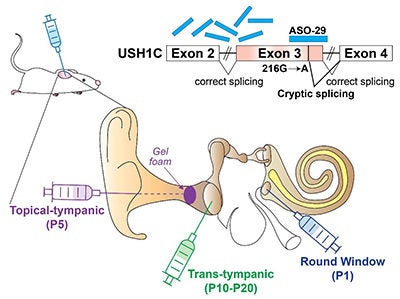
Illustration of antisense oligonucleotides (ASO-29) treatment being applied to three different parts of the ear. The Round Window injection was most effective and resulted in unprecedented recovery of auditory and vestibular function.
Usher syndrome is a devastating disease associated with loss of hearing, vision and in some cases severe balance deficits. The lab of Dr. Geleoc, at Boston Children’s Hospital, investigates the function of several hair cell genes associated with hearing loss including Usher syndrome and develops and assesses novel therapies to protect or restore auditory function. In collaboration with Dr. Lentz from Louisiana State University, she assessed the local use of short antisense oligonucleotides (ASO-29) which can alter translation and correct for mutations such as the Acadian USH1C splicing mutation (Lentz et al. Hum. Genet. 2005). The team assessed three different local applications of the ASO agent and demonstrated that intracochlear injection led to unprecedented recovery of auditory and vestibular function. These results demonstrate the therapeutic potential of ASOs to treat hearing and balance deficits associated with Usher syndrome and other diseases.
Gwenaelle Geleoc is Assistant Professor of Otolaryngology at Harvard Medical School and Boston Children’s Hospital. Her lab is focused on functional studies of sensory hair cells in the inner ear and the development of novel therapies for the treatment of auditory and balance disorders.
Learn more in the original research article:
Direct Delivery of Antisense Oligonucleotides to the Middle and Inner Ear Improves Hearing and Balance in Usher Mice. Lentz JJ, Pan B, Ponnath A, Tran CM, Nist-Lund C, Galvin A, Goldberg H, Robillard KN, Jodelka FM, Farris HE, Huang J, Chen T, Zhu H, Zhou W, Rigo F, Hastings ML, Géléoc GSG.Mol Ther. 2020 Aug 5:S1525-0016(20)30412-3. doi: 10.1016/j.ymthe.2020.08.002.
News Types: Community Stories
